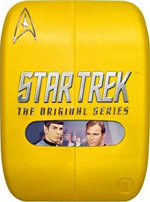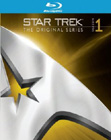Balance of Terror
Now here's a story that I like primarily for its tremendous success at
"world-building" in the Trek universe, as well as delivering the first
real ship-to-ship battle sequences that Star Trek ever put on screen.
However, it's not that great at philosophy, doing little more than
empathetically showing how soldiers can doubt themselves and contemplate
their navels.
It's hard not to notice, appreciate, and like the world-building here.
We introduce the Romulans, the Neutral Zone, and the entire historic backstory
of Human-Romulan relations, which is basically "WAR!" and describes a very
primitive way of achieving that (which the later "Enterprise" series couldn't
properly adhere to). That's a huge chunk of Trek mythology, and probably spun out
purely as part of a one-off episode. If only they'd known how much mileage
the franchise would later make out of what was first wrought here.
It's also a bit funny in retrospect to see actor Mark Lenard in this one.
He later became so endeared to the franchise as Spock's father Sarek,
the Vulcan Ambassador to Earth, and with this same basic appearance to boot,
that one almost has to make an effort to remember
that he's playing a different character entirely here, of a different species.
The big revelation of the Romulan's appearance almost feels like a personal
revelation, as though the crew want to say, "Spock, what's your papa doing
on the enemy ship?" But of course, none of them have met Sarek yet.
The visual effects people make significant effort to put good visuals on
our screen to depict the battle and the arena in which it takes place.
Interestingly, the trailer uses only one model shot recycled from
"The Corbomite Maneuver",
showing the Enterprise's phasers firing. But
"Balance of Terror" now changes to a much different effect. Though the
dialogue insists quite heavily that the Enterprise is firing phasers
throughout the battle, the effect we get will later be much better known
for depicting the launch of photon torpedoes, which I guess the writers
hadn't thought of yet.
But the Trek team does very well here in creating a satisfying model for the
Romulan ship, and letting it visually demonstrate the now infamous cloaking device,
which must disengage to allow the ship to fire weapons. - All staple tactics
that will be repeated in countless future episodes. And the Romulans get a decent
effect for firing their weapons too. All good.
Nevertheless, we wonder how much good the invisibility cloak is, if sensors
can typically detect the ship anyway. At the vast distances involved in space,
visual invisibility wouldn't really count for much tactically all on its own.
Well, I guess the cloak is meant to be brand new here. There is room left
to improve it for "The Enterprise Incident", room which will work for that story.
More Logic of Fear
The episode's philosophical territory is of dubious note though.
Most prominent in my mind is that this is the second of two anchor points
for the primitive end of the evolution of Spock's philosophy. As was the case
previously in
"Where No Man Has Gone Before",
his logic serves a philosophy
of fear here, as he recommends action for protection and survival. Attack
so as not to appear weak. I'd say it's a tad more balanced and reasonable
here than it was in the show's second pilot. But we should also keep in mind
that Spock will end up far on the other end of the spectrum by the time
we get to
"Unification",
and pretty much with these same "adversaries".
There he recommends understanding, compassion, and a stance much closer
to the celebration of Infinite Diversity.... and it is all equally logical,
of course. For now, we're just stuck watching the dark beginning.
Another bizarre philosophical entry is Kirk's navel-examining scene in his
quarters with McCoy. The actors do such a fine job of emoting everything
that such a scene should be, we may not notice that their actual dialogue
doesn't really seem to mean anything. Kirk feels the weight and pressure
of so many lives depending on his decisions, and McCoy basically pats his back
and tells him how poetically someone thought he was special enough to be exempted
from destruction. Huh? To whom was that speaker talking, who might otherwise want
to bump off Kirk? What should we the audience take from that to help us in
our daily struggles? Wait for "special" Kirk to show up and rescue us?
Other philosophical tidbits fail to rise to any significantly interesting or
profound levels. Today's navigator Lt. Stiles
struggles with bigotry and learns a canned lesson. Spock maneuvers
more delicately around Stiles than he otherwise would, aware of the issue...
but is that what causes him to slip and accidentally reveal their position
to the enemy?
(And this sequence betrays tactics that probably can't really make sense in space).
Though the episode's action remains good, and builds to a decent climax,
with victory and a regret that the adversaries were adversaries to begin with,
"Balance of Terror" also attempts something with its bookending subplot
of an engaged couple on their wedding day.... and I'm not sure what the writer
was trying to say there, because none of the characters involved are very articulate
about anything in particular. Yeah, war sucks because people die. It's kind
of obvious without hitting it so painfully. At any rate, keep an eye peeled
for Barbara Baldavin playing Angela Martine. She'll be back to serve on
Enterprise again one day (very last episode ever, if I remember rightly),
although I think her surname changes. Perhaps she eventually married after all.
Yeah, though I like this episode, I'm just not prepared to rave over it or
rank it quite as highly as most other Star Trek fans, and it really is only in the
philosophical arena where the episode isn't delivering quite strongly enough
to sit well with me. I think we see here in this episode a lot of actors
doing really well to emote philosophical speeches with charisma and the
power to convince, all of which is great for character building. The Romulans
benefit most from this, as a culture, making their numerous returns in the franchise
highly welcome and worthwhile. But the primary philosophical flavour emerging
in this episode is quite hypocritical - talk eloquently about one thing,
while doing another - and actions always speak much louder than words,
even if words are great for clarifying what a character thinks his
actions are accomplishing or working towards. But there's just too much
divide between the spoken words and the entrenched policies of action
on display here, and the spoken words remain quite muddled when looked at clinically,
when one looks past the "selling power" of the actors' emotions. It's
got all the warning signs of propaganda, and that's not surprising if indeed
this story was modeled after the war film "The Enemy Below" as producer
Robert H. Justman admits on the extras. Saddest of all, Star Trek will do
this kind of show a bit too often... a one-on-one substitution with Starfleet
imitating the real-world military of contemporary present day or recent past,
filled with soldiers struggling to appease their consciences
and excuse their actions. I'd really rather see them take the beautifully
articulated philosophies and wisdoms and insist on finding a way to act
on that. That's when Star Trek becomes great. For my money, TNG did it most often
during the middle of its run, but TOS here will have its great moments too.
"Balance of Terror" isn't really one of those examples, so it's not in my
top ten episodes. But hey, not every episode has to hit all the nails on the
head in order to be enjoyable. This one is still good.
Perhaps the episode just went a bit TOO far by making Tomlinson a fatal casualty
(and indeed the ONLY fatal casualty), and then by also offering the most common,
canned, lame cop out for an explanation - that it was senseless.
Firstly, I believe you CAN find much better sense in such things
if you truly dig deep enough into someone's psyche, into their soul and
their beliefs, into the thoughts they were focusing on that day, into what
they may have drawn into their world through the Law of Attraction,
and if you're wily enough to stay out of the traps of blame
and stay focused on seeking the empowerment to make more conscious choices in future.
It's not common to find any such depth of examination in the kind of war films
that this episode was patterned after, and so could be a great area
into which Star Trek could break out and explore new territory.
But there REALLY isn't the screentime to do justice to that kind of
thorough metaphysical examination in "Balance of Terror" with all the other
more successful elements quite rightly taking center stage.
I'd just prefer something different
to the impression that Kirk's attempts to console the widow were limited
to the canned 1940's war film cliché, and then nothing more. Leave something
off-screen, to the imagination... Or change the events themselves to something
more manageable and satisfying within the spare time available to the episode.
Anyway, this little bookend debacle ensures that "Balance of Terror" has a
VERY downbeat ending, such that the often alluded to Trek optimism is still
a bit on the elusive side. Trek is trying its best to really do sci-fi
with these early episodes, and succeeding nicely, but I think anthology
sci-fi was quite accustomed to the downbeat ending that really tried to make
you think. The real Trek essence was still struggling to achieve some kind
of episodic regularity.
At any rate, "Balance of Terror" is a good episode, but not really
an outstanding one.
But it laid a lot of good groundwork for the franchise's action stories, and
remains a nostalgic success.
Read the next Star Trek review:
"The Conscience of the King"
|
|














